The BRIDGE project aims to develop a framework of analysis and policy engagement to improve the resilience of the Brazilian Food-Water-Energy (FWE) nexus to global environmental and economic change, in close cooperation with the Brazilian academic community. It combines established UK expertise and specifically developed, state-of-the-art analytical capacity in socio-economic and environmental modelling to build a robust environmental policy assessment methodology for the Brazilian FWE nexus in the context of global change. The modelling capacity, skills and knowledge will be transferred to relevant actors in Brazil to enable local academics to continue informing and engaging policymakers through a continued sustainability transition during and beyond the end of this project.
The project is funded by the Newton Fund, a collaboration between UK and Brazil Research Councils, the ESRC and FAPESC.

BRIDGE is a three years project, with a consortium formed of five institutions, led by the University of Cambridge (UK) and the University of the South of Santa-Catarina UNISUL (Brazil), with Co-Investigators at the University of Exeter (UK), Cambridge Econometrics Ltd (UK) and The Open University (UK).
Project partners are as follows:
- Scientific direction: Jean-Francois Mercure, University of Exeter and University of Cambridge
- Administrative direction in UK: Jorge Vinuales, University of Cambridge
- Administrative direction in Brazil: Baltazar Andrade Guerra, UNISUL
WP1 - Management
Leader: Jean-Francois Mercure
WP2 - Modelling
Leader: Jean-Francois Mercure
- The diffusion of innovation and land-use modelling: Jean-Francois Mercure and Soeren Lindner, University of Exeter
- Macroeconomics and trade: Hector Pollitt, Cambridge Econometrics Ltd
- Climate change modelling and the planet surface: Neil Edwards, The Open University
WP3 - Policy Analysis and Stakeholder Engagement
Leader: Jorge Vinuales
- Stakeholder Engagement - Maria Augusta Paim and Pablo Salas, University of Cambridge
- Policy Mapping and Analysis - Maria Augusta Paim, University of Cambridge
WP4 - Pilot Action Projects
Leader: Baltazar Andrade Guerra
- Management of the Pilot Action Projects - Baltazar Andrade Guerra, Rafael Faraco, Joao Marcelo, Issa Berchin, UNISUL, Florianopolis, Brazil
WP5 - Public Dissemination and Engagement
Leader: Baltazar Andrade Guerra
WP6 - Innovation, Diffusion and Technology Transfer
Leader: Pablo Salas
Representative Research Output
- Oxford Handbook of Comparative Environmental Law, Viñuales, J.-E. (ed.) (forthcoming)
- Macroeconomic impact of stranded fossil fuel assets. Mercure, J.-F., Pollitt, H., Viñuales, J.E., Edwards, N.R., Holden, P.B., Chewpreecha, U., Salas, P., Sognnaes, I., Lam, A., Knobloch, F. Nature Climate Change (2018)
- System Complexity and Policy Integration Challenges: the Brazilian Energy-Water-Food Nexus, J.-F. Mercure, M.-A. Paim, P. Bocquillon, S. Lindner, P. Salas, P. Martinelli, I.I. Berchin, J.B.S.O.A. Guerra, C. Derani, C. L. de Albuquerque Junior, J.M.P. Ribeiro, F. Knobloch, H. Pollitt, N. R. Edwards, P. B. Holden, A. Foley, S. Schaphoff, R.A. Faraco, & J. E. Viñuales, C-EENRG Working Papers, 2017-6
- The importance of international conferences on sustainable development as higher education institutions’ strategies to promote sustainability: A case study in Brazil. Berchin, I. I., Sima, M., de Lima, M. A., Biesel, S., dos Santos, L. P., Ferreira, R. V., … & Ceci, F. Journal of Cleaner Production, 171, 2018, 756-772
- Contributions of Public Policies to Greening Sugarcane Ethanol Production in Brazil. Berchin, I. I., da Silva, S. A., Bocquillon, P., Fornasari, V. H., Ribeiro, L. P. C., Ribeiro, J. M. P., & de Andrade, J. B. S. O. In Towards a Sustainable Bioeconomy: Principles, Challenges and Perspectives, Springer, Cham., 2018, 375-393
- The adoption of strategies for sustainable cities: a comparative study between Newcastle and Florianopolis focused on urban mobility. Guerra, J. B. S., Pereira Ribeiro, J. M., Fernandez, F., Bailey, C., Barbosa, S. B., & Neiva, S. D. S. Journal of Cleaner Production, 163, 2027, S209-S222
- Climate change and forced migrations: An effort towards recognizing climate refugees. Berchin, I. I., Valduga, I. B., Garcia, J., & de Andrade, J. B. S. O. Geoforum, 84, 2017, 147-150.
- Education for Sustainable Development and Its Role in the Promotion of the Sustainable Development Goals. Garcia, J., da Silva, S. A., Carvalho, A. S., & de Andrade, J. B. S. O. In Curricula for Sustainability in Higher Education, Springer, Cham., 2017, 1-18.
- Promotion of Sustainable Development at Universities: The Adoption of Green Campus Strategies at the University of Southern Santa Catarina, Brazil. Ribeiro, J. M. P., Barbosa, S. B., Casagrande, J. L., Sehnem, S., Berchin, I. I., da Silva, C. G., … & de Andrade, J. B. S. O. In Handbook of Theory and Practice of Sustainable Development in Higher Education Springer, Cham. 2017, p. 471-486
BRIDGE Consortium
BRIDGE Consortium
Project leaders:
Scientific direction: Dr Jean-Francois Mercure, J.Mercure@exeter.ac.uk
Senior Lecturer in Global Systems, University of Exeter, UK
Dr Mercure coordinates quantitative modelling in energy, land-use, economics, innovation and climate change
Policy and international law: Professor Jorge Viñuales, jev32@cam.ac.uk
Cambridge Centre for Energy, Environment and Natural Resource Governance (C-EENRG), Director and Centre Fellow
Based in the UK, Prof Viñuales coordinates research on mapping complex regulatory systems, political networks and strategic policy-making.
Engagement: Prof Baltazar Guerra, Baltazar.Guerra@unisul.br
Energy Eficiency and Sustainability Research Group at UNISUL (GREENS)
Based in Brazil, Prof Guerra coordinates engagement, communication and outreach in BRIDGE.
University of Cambridge, Cambridge Centre for Energy, Environment and Natural Resource Governance (C-EENRG)
The University of Cambridge, based in the United Kingdom, is one of the oldest and most prestigious universities in the world, with more than 800 years of history and 96 Nobel Price laureates. The mission of the University of Cambridge is to contribute to society through the pursuit of education, learning, and research at the highest international levels of excellence. The University is formed from a variety of institutions which include 31 constituent colleges, over 100 academic departments organised into six schools, and approximately 20,000 students.
The Cambridge Centre for Environment, Energy and Natural Resource Governance (C-EENRG), where the BRIDGE project is hosted, belongs to the Department of Land Economy, part of the School of Humanities and Social Sciences. C-EENRG is a leading international centre with an intensive research-oriented environment, with the mission of conducting integrative research on the governance of environmental transitions, understood as social and technological processes driven by environmental constraints that lead to fundamental changes in social organisation. C-EENRG works in close collaboration with other groups and centres within the University, as well as with prestigious international organisations around the world.
Leader and contact point: Professor Jorge Viñuales, jev32@cam.ac.uk
Harold Samuel Professor of Law and Environmental Policy, Director of C-EENRG and Chairman of the Compliance Committee UN-ECE Protocol on Water and Health
Postdoctoral researchers:
- Pablo Salas, pas80@cam.ac.uk
- Maria Augusta Paim, map75@cam.ac.uk
University of Exeter, Department of Geography, Global Systems Institute

The University of Exeter combines world class research with excellent student satisfaction at its campuses in Exeter and Cornwall. It is a member of the Russell Group of leading research-intensive universities. Formed in 1955, the University has 22,085 students from more than 130 different countries. Its success is built on a strong partnership with its students and a clear focus on high performance.
The Department of Geography is one of the most successful in the UK, with an excellent reputation for both teaching and research. They continue to recruit world-leading academic staff at the forefront of their fields of research who are committed to bringing out the very best in their students. As a result, they attract high-quality, ambitious students from both the UK and abroad, who flourish in this inspirational environment. Jean-Francois Mercure leads a research team that develops and uses, in collaboration with Cambridge Econometrics and The Open University, the highly detailed Integrated Assessment Model E3ME-FTT-GENIE1.
Leader and contact point: Dr Jean-Francois Mercure, J.Mercure@exeter.ac.uk
Senior Lecturer in Global Systems
Postdoctoral researcher: Soeren Lindner, soerenm.lindner@gmail.com
UNISUL – University Southern Santa Catarina Brazil,
Energy Eficiency and Sustainability Reserach Group at UNISUL (GREENS)
Unisul (Universidade do Sul de Santa Catarina) is a multicampi education institution involved in production, development, and diffusion of knowledge by means of research, teaching and extension at all the knowledge areas, in-class and e-learning teaching. Since its creation in 1964, UNISUL focuses on preparing a the new generation for new world challenges, supports innovation to face societal change, and invests in partnerships and agreements with other teaching institutions worldwide. It consists of three campuses: Tubarão, Grande Florianópolis and Unisul Virtual: and their respective branches in: Imbituba, Içara, Araranguá, and Braço do Norte; also university branches in Pedra Branca and Florianópolis, making up more than 100 e-learning branches in all.
Greens is a research center locate in Santa Catarina, Brazil, that works on sustainability that researches on sustainable development and Food-Water-Energy approach, education for sustainable development, environmental justice, sustainable and smart cities, clean technology. Greens brings together around 20 researches from Brasil, Canada, United Kingdom and United Stated of America from the following universities: Unisul, UFSC, Cambridge University, Manitoba University (Canada) Liverpool University (UK).
Leader and contact point: Prof Baltazar Guerra, Professor of management, Baltazar.Guerra@unisul.br
UNISUL project members:
- Prof Rafael Faraco, Rafael.Faraco@unisul.br
- Prof Celso Lopes De Albuquerque Junior, Celso.Albuquerque@unisul.br
- Issa Berchin
- Joao Marcelo
Cambridge Econometrics
Cambridge, UK
Cambridge Econometrics (CE) was founded in 1978 as a spin-off from the University of Cambridge with the aim of providing commercial access to modelling and other applied economic research. Our mission is to provide rigorous, accessible and relevant independent economic analysis to support strategic planners and policy-makers in business and government. As a leading energy-environment-economy modelling consultancy, CE has considerable expertise in integrated solutions and assessment approaches relevant to the FWE nexus; crucially, including economic linkages.
The Energy, Climate and Circular Economy team at Cambridge Econometrics specialises in quantitative analysis of issues relating to links between the energy, environmental and economic systems at a national and international scale, including applications of our E3ME model. The E3ME model is regarded as one of the most advanced analytical tools available and we regularly work with key organisations in the international policy-making and research communities. Our clients include the European Commission, national governments, and NGOs such as the European Climate Foundation, IRENA and RAP, for whom we design and apply modelling tools and data analysis to inform policy makers, and help them to address complex questions including the economic and environmental impact of energy and climate policy.
BRIDGE project at Cambridge Econometrics
- Leader and contact point: Hector Pollitt, Director and Head of Modelling, hp@camecon.com
- Primary modeller: Unnada Chewpreecha, Project Manager, uc@camecon.com
The Open University
Milton Keynes, UK
The Open University (OU) is the UK’s premier distance-learning institution and one of the largest universities in Europe with more than 150,000 students. With its unparalleled tradition of innovation in distance-learning technology, the University helped to pioneer the free distribution of learning material on the internet through the OpenLearn initiative and in 2012 launched FutureLearn, the Us first major platform for Massive Open Online Courses (MOOCs), as a wholly-owned subsidiary. By June 2014 FutureLearn had 36 UK and international university partners. The OU also has a long-standing relationship with the UK’s national broadcaster, the BBC, and has been involved in high-profile television science series including Frozen Planet, Coast and Bang Goes the Theory.
The University has an active research programme, winning around a 30 million of research income annually, and in 2013-2014 recruited more than 1,000 postgraduate students. The School of Environment, Earth and Ecosystems is a particularly strong research grouping working on both modern and palaeo environmental research questions, and including the Earth system modelling team that contributes to BRIDGE. The team works with and develops intermediate complexity Earth system models, notably the GENIE model, and studies climate impacts both in past and future settings.
- Leader and contact point: Prof Neil R. Edwards, Professor of Earth System Science, Neil.Edwards@open.ac.uk
- Allied researcher: Dr Phil Holden, Lecturer (Assistant Professor) and research staff, Philip.Holden@open.ac.uk
BRIDGE Community of Practice
BRIDGE Community of Practice
The BRIDGE Project Community of Practice was established during the International Workshop in April 2017, and it is composed by stakeholders of the public and private sectors, including academics, policy-makers and members of the civil society in the areas of Energy, Water, Agriculture and Conservation.
During the Workshop Engagement activities, the BRIDGE Project researchers have explained to the members of the Community of Practice the type of modelling and law and policy work being conducted on the Nexus in Brazil (identification of work, research institutions, and relevant contacts in government/private sector/civil society), the projected windows of opportunity as understood by our Brazilian colleagues and other stakeholders, and the channels for both collaboration and impact. The attendees were separated in 4 groups, according to their expertise in the areas of Water, Energy, Food and Conservation.
In each small group session the participants were encouraged to share their ideas about the interconnections between their groups sector and the others in Brazil, followed by the presentation of the summary of the ideas discussed to all the participants. The Community of Practice has played a key role in the identification of the most relevant Water-Energy-Food Nexus issues in Brazil.
The BRIDGE researchers will consult the Community of Practice for information and further discussions related to the most relevant Water-Energy-Food Nexus issues in Brazil and potential collaborations to strengthen the resilience of Brazil to global economic and environmental change.
Members of the Community of Practice
Aleix Altimiras Martin, UNICAMP
aleix@ige.unicamp.br
Professor at the Department of Scientific and Technological Politics
Gisele Mazon, UNISUL
gisamazon@gmail.com
PhD in Tourism and Business Management (Itajaí – UNIVALI), Lecturer, research topics: dynamic capacities in organizations processes for environmental adaptations
Marcos José de Abreu (Marquito), Câmara de Vereadores de Florianópolis – SC
marcosjosedeabreu@gmail.com
Agronomist engineer holding a Master Degree in agro-ecosystems (UFSC), councilman (PSOL party). Areas of interests: food security and nutrition and agro-ecology in the rural and urban contexts.
Rachel Faverzani Magnago, UNISUL
rachel.magnago@unisul.br
PhD in Organic Chemistry (UFSC), Lecturer of the undergraduate courses in Engineering and postgraduate studies in Environmental Sciences, research topics: the interlocution between chemistry and engineering, with emphasis on synthesis of liquid crystals, and the development of new materials from waste production processes. Collaborator of the Research Group Science, Technology and Innovation in Materials (CTIM).
Ricardo Barcelos, SENAC/SC
ricardo.barcelos73@gmail.com
Lecturer, research topics: production processes and responsible consumption for sustainable supply chain
Rodrigo de Freitas, Unisul
rodrigo.manejo@gmail.com
PhD in Environment and Society, Lecturer of Fishing Biology and coordinator of the GRUC – Grupo de Pesquisa em Conservação de Recursos Naturais de Uso Comum (https://grucunisul.blogspot.com.br) and Colaborator of the CGCommons – Grupo de Pesquisa em Conservação e Gestão de Recursos de Uso Comum (NEPAM/UNICAMP)
http://cg-commons.wixsite.com/commons
Samuel Borges Barbosa, Unisul
osamuelbarbosa@gmail.com
PhD in Engineering of Production (UFSC), Lecturer and Researcher, research topics: development of products, public transport services management and sustainability.
Member of the GEPPS – Grupo de Engenharia de Produtos, Processos e Serviços (GEPPS/UFSC), and GREENS – Grupo de Pesquisa de Eficiência Energética e Sustentabilidade (GREENS/UNISUL); Collaborator of LINKS 2015 and BRIDGE.
Tayse Valdira Vieira, UNISUL
tayse.vieira@unisul.br
Academic staff of the Innovator Professors Programme from the Teaching, Research and Extension Division
BRIDGE Advisory Board
BRIDGE Advisory Board
The BRIDGE project counts with an Advisory Board, that provides guidance and support in several aspects of the project, including:
- Participate in BRIDGE-related events.
- Provide feedback on the academic outputs that are relevant to them.
- Carry out WEF Nexus research alongside the BRIDGE team, sharing/comparing results and co-authoring academic publications.
- Feed data/information to stakeholders, maximising the impact of BRIDGE.
The members of the Advisory Board, divided by area, are:
Law and policy analysis
- Cristiane Derani, Universidade Federal de Santa Catarina (UFSC)
- Andréia Costa Vieira, Universidade Católica de Santos (UNISANTOS)
- Leonardo Secchi, Universidade do Estado de Santa Catarina (UDESC)
- Frederico Poley Martins Ferreira, Fundação João Pinheiro
Economics and technical analysis
- Amaro Pereira, Universidade Federal do Rio de Janeiro (UFRJ)
- Marcus Seferin, Pontificia Universidade Católica do Rio Grande do Sul (PUCRS)
- Cassio Stein Moura, Pontificia Universidade Católica do Rio Grande do Sul (PUCRS)
- Odilon Francisco Pavon Duarte, Pontificia Universidade Católica do Rio Grande do Sul (PUCRS)
- Aleix Altimiras Martin, Universidade Estadual de Campinas (UNICAMP)
- Heleen de Coninck, Radboud University
- Fernanda Tayt'sohn, Universidade Federal do Rio de Janeiro (UFRJ)
Innovation and technology transfer
- Milton Mori, INOVA (UNICAMP)
- Marli Elizabeth Ritter dos Santos, Pontificia Universidade Católica do Rio Grande do Sul (PUCRS)
- Diego Jacob Kurtz, Fundação CERTI
BRIDGE Work
BRIDGE Work
Brazil faces significant challenges due to two significant global contextual factors. On the one hand, climate change is highly likely to change weather patterns, which will affect detrimentally the land cover and biodiversity in Brazil, with severe impacts on agriculture. On the other hand, Brazilian economy relies heavily on exports of natural resources for prosperity, and global changes in demand for commodities could lead to either or both environmental degradation and large scale land-use change, and decreased wealth and employment. Both types of changes are likely to impact and create intricate complexities in the Brazilian Food-Energy-Water nexus. These transformations and forces must be understood in order to minimise detrimental impacts to welfare and the environment in Brazil.
The BRIDGE project is developing a framework of analysis and policy engagement to improve the resilience of the Brazilian Food-Water-Energy (FWE) nexus. In this context, we are inviting leader academics and policy makers in Brazil to join a group of international experts in the analysis of laws and policies for strengthening Brazilian resilience to global environmental and economic change
BRIDGE Publications
BRIDGE Publications
- Oxford Handbook of Comparative Environmental Law, Viñuales, J.-E. (ed.) (forthcoming)
- Macroeconomic impact of stranded fossil fuel assets. Mercure, J.-F., Pollitt, H., Viñuales, J.E., Edwards, N.R., Holden, P.B., Chewpreecha, U., Salas, P., Sognnaes, I., Lam, A., Knobloch, F. Nature Climate Change (2018)
- System Complexity and Policy Integration Challenges: the Brazilian Energy-Water-Food Nexus, J.-F. Mercure, M.-A. Paim, P. Bocquillon, S. Lindner, P. Salas, P. Martinelli, I.I. Berchin, J.B.S.O.A. Guerra, C. Derani, C. L. de Albuquerque Junior, J.M.P. Ribeiro, F. Knobloch, H. Pollitt, N. R. Edwards, P. B. Holden, A. Foley, S. Schaphoff, R.A. Faraco, & J. E. Viñuales, C-EENRG Working Papers, 2017-6
- The importance of international conferences on sustainable development as higher education institutions’ strategies to promote sustainability: A case study in Brazil. Berchin, I. I., Sima, M., de Lima, M. A., Biesel, S., dos Santos, L. P., Ferreira, R. V., … & Ceci, F. Journal of Cleaner Production, 171, 2018, 756-772
- Contributions of Public Policies to Greening Sugarcane Ethanol Production in Brazil. Berchin, I. I., da Silva, S. A., Bocquillon, P., Fornasari, V. H., Ribeiro, L. P. C., Ribeiro, J. M. P., & de Andrade, J. B. S. O. In Towards a Sustainable Bioeconomy: Principles, Challenges and Perspectives, Springer, Cham., 2018, 375-393
- The adoption of strategies for sustainable cities: a comparative study between Newcastle and Florianopolis focused on urban mobility. Guerra, J. B. S., Pereira Ribeiro, J. M., Fernandez, F., Bailey, C., Barbosa, S. B., & Neiva, S. D. S. Journal of Cleaner Production, 163, 2027, S209-S222
- Climate change and forced migrations: An effort towards recognizing climate refugees. Berchin, I. I., Valduga, I. B., Garcia, J., & de Andrade, J. B. S. O. Geoforum, 84, 2017, 147-150.
- Education for Sustainable Development and Its Role in the Promotion of the Sustainable Development Goals. Garcia, J., da Silva, S. A., Carvalho, A. S., & de Andrade, J. B. S. O. In Curricula for Sustainability in Higher Education, Springer, Cham., 2017, 1-18.
- Promotion of Sustainable Development at Universities: The Adoption of Green Campus Strategies at the University of Southern Santa Catarina, Brazil. Ribeiro, J. M. P., Barbosa, S. B., Casagrande, J. L., Sehnem, S., Berchin, I. I., da Silva, C. G., … & de Andrade, J. B. S. O. In Handbook of Theory and Practice of Sustainable Development in Higher Education Springer, Cham. 2017, p. 471-486
Pilot Projects
Pilot Projects
Greenhouse Hydroponic Photovoltaic System
This pilot project aims to evaluate a more sustainable vegetables production through a less fresh water use and a solar power energy system. This system will use around 4% of water if comparable to a traditional vegetable production. Besides of that, this module pilot will use alternative ecological fertilizers that contribute to the sustainability agriculture. The estimate production is 2.000 thousands plants a month that part of it will be offered to charity institutions in the region.
Education for Sustainability
The Education for Sustainability pilot project aims to bring to the schools and universities good practices of environmental education. At the Rancho Queimado public school we have an initiative related to energy efficiency where all energy consumption is supplied by a photovoltaic system. Besides, the energy efficiency initiative, the classes are usually involved with sustainable pedagogical activities. At Unisul, for example, we have an Environmental Education Policy that regulate the practices that should be followed at the academic environment.
Green Roofs and Green Walls
This pilot module aims to show the green building properties related to the green walls and greens roofs at Unisul Campus. The green walls bring to the environment a very nice atmosphere and help to make more comfortable the buildings. As to the temperature, the green walls and green roofs help to improve thermic comfort.
Dissemination Practices
The dissemination practices are part of a movement towards to the consciousness creation about the Nexus Food-Energy-Water. Besides the scientific events the project will involve policy makers, decision makers and the civil society in general.
Engagement
We believe the strengthening of Brazil’s resilience to global economic and environmental changes, particularly in the areas of food, water and energy, can only take place through the implementation of effective policy frameworks in collaboration between stakeholders, researchers and policy-makers. In this context, each of these groups need to be empowered to play their respective role, and knowledge generation from this project aims at just that. Informing policy-making effectively for successfully managing a sustainability transition can take place in different ways: through engagement of the policy sphere by the academic sector, through consultation and engagement of civil society and stakeholders with policy-makers, and through efficient consultancy for governments.
All the knowledge resultant from the BRIDGE project will be retained by academics and researchers, who will engage with stakeholders, the local and national government in Brazil in order to inform with a strong evidence base a sustainable transition in the Food-Water-Energy nexus. Such a transformation requiring to be scientifically informed at every stage, the analysis capacity produced in this project will require to be maintained, further improved and used beyond the end of this project in collaboration with the authorities and relevant policy actors.
Case Study on Policy Engagement: Florianopolis City Councelor Maikon Costa
A crucial aspect of the BRIDGE project is the work we do on policy engagement, especially at the local level in Santa Catarina. Professor Baltazar Guerra, the BRIDGE PI in Brazil, has been working with local policy makers for more than a decade, addressing sustainability issues at the city, state and federal levels.
A particularly successful collaborations has been taking place with Florianopolis City Councelor Maikon Costa. Maikon has supported the organisation and delivery of BRIDGE project activities in Florianopolis, including the international workshop of 2017, where the Nexus challenges of Brazil were discussed in detail.
In September 2018, Dr Pablo Salas (PS) and Prof. Baltazar Guerra (BG) interviewed Maikon Costa (MC), to know more about his work on sustainability, his connection with the BRIDGE project and the influence of BRIDGE on his 'Urban Farming' bill proposal at the Florianopolis City Council. Here we present an extract of the interview.
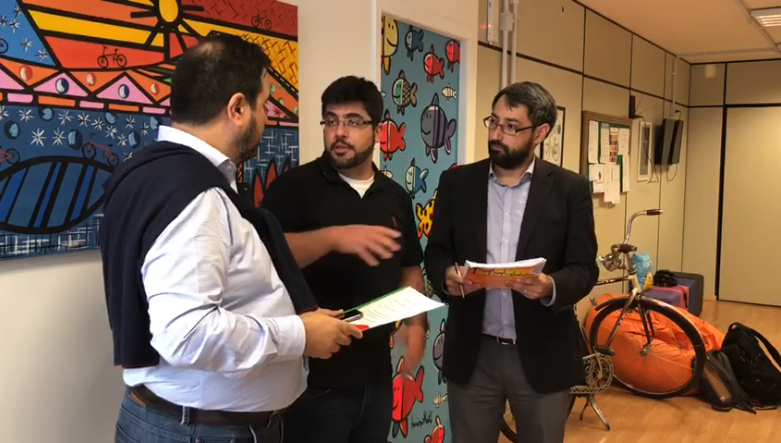
Prof. Baltazar Guerra (left) and Dr Pablo Salas (right) interviewing Florianopolis City Councelor Maikon Costa (centre).
PS - Dear Maikon, it is a pleasure to visit you again. Considering your collaboration with UNISUL and the BRIDGE Project, we would like to know a bit more about your work as a policy-maker at the city council. Could you please describe what do you do?
MC - My mandate is focused in sustainability issues, mainly related to urban mobility. Public transport is still precarious in Brazil, differently from Europe [...] I work with the promotion of the urban mobility, and also with sustainability matters. The urban mobility is not only the way in which people use transport or how they move effectively, but it is also an urbanistic matter, related to the urban development, which means to have things closer for the people's access. The urban farming comes from this context as a place where the people can access the food more closely from where they live, automatically; this means, they do not need to move to get to where the food is produced. In this case they are contributing in an indirect way to the urban mobility in the city.
PS - Please, can you tell us about your collaboration with UNISUL. I would like to know how the collaboration between the City Council, and particularly you, and the University started.
MC - Professor Baltazar Guerra has come to us by the assessor Jonathan, and when the first contact was made, we perceived a great synergy amongst us. We have involved the community from UNISUL, which is a community University, with a community nature. This collective work has provided several contributions and we have opened the doors of the institution City Council to broaden the synergy. Then, when the opportunities with the University of Cambridge have happened, it was time for us [policy-makers] to get rid of the discourse, to move it from the university benches, from the pure academic perspective, and to finally make it that the legislations come into practice, effectively, to get out from the discourse level to be out into practice.
PS - Your participation [in the Community of Practice, as part of the BRIDGE Project workshop in April 2017] was remarkable. Could you please tell us how was this experience with the academics, how was to talk with them about sustainability issues?
MC - My first impression is that there is still a large distance between the university benches, dealing with ideas, with scientific matters; and putting things into practice, which means, there is room to get closer. It is not enough for one councilor to open the doors of his or hers office, but all the City Council and City Hall must open their doors to the scientific knowledge. [...] We need to change this reality, we need to open the doors of the community, of the Universities, to bring them inside the City Council, and vice-versa. We need to get closer. There is a lot to do, this is only a little seed that was planted. I usually say 'it takes a lot to become beautiful', we are miles away from the real improvement, we need to get closer.
BG - [Maikon] Your participation in the Community of Practice was great. You were one of the organizers of the event, to be honest, the participation of the City Council was made throughout your intermediation, followed by more engaged councilors, such as Afrânio, Lino Peres, Marquito and Pedrão. It was a very significant participation, in an important dialogue between the university and the political power. In that moment of the community of practice we had the discussion about the BRIDGE Project scientific paper. Would you say they have contribute and inspire the Urban Farm draft bill?
MC - A lot, because maybe our vision of those issues and impacts is too local, but we need to be aware of what is happening in other countries. The migration process, for instance, we have been seen recently the issues in Venezuela and how they impact the Brazilian reality. Therefore we need to act locally, focus on the local work and consider the local action as a little seed for other regions to do the same. When we work with a specific community, is not that we prefer it, it is because we are making other communities do the same, as an incentive for other communities. Until we can make it reflects, as a resonant box, to other places, to other countries, in a transformation process.
BG - Can we say that the dialogue we had in the University, the productive sector, and the Municipal Legislative Power, in this case your office, had a positive contribution to the making of the Law [of Urban Farming], that there was a synergy in that moment?
MC - A lot, because it showed clearly that local actions are very important for making global progress. This was the main point. Therefore, there is no use on thinking globally, if we do not act in our home. If each one of us make its part, effectively we are going to make a transformation. As Gandhi says, if you want a change for the world, begin [with yourself]; if you want your street clean, begin by cleaning your sidewalk. This change starts by changing your actions.
BG - 'Be the change that you want to see'.
MC - We want to make a transformation, starting with Florianópolis and spreading to other Municipalities, making changes. We are not going to see the results, we cannot observe them now,. These are results for the next 5, 10, 15, 20, 30, 40 years. It is like the Law that transfers 20% of the Municipal revenues from the transit of vehicules to urban mobility, to the infrastructure sector. We will not see the results right now, these are result for the next 10 years. But the law was made now, and the results take considerable time to be adopted into practice.
PS - We would like to know what is your vision of the future [...] What are your plans for future legislations, in which you are working?
MC - The future belongs to God. I sincerely hope that I can help the city, regardless of the position that I occupy. Whether as a councilor, a community leader, a citizen, I want to help using the instruments and tools that are given to me. I am now candidate for Federal Deputy. At the moment, I am discussing on the Brazilian model which concentrates a lot of power at the federal level, and little power in the hands of States Deputies and City Councilors. We need to invert such pyramid, to review the legislative power, take the power from the hands of federal deputies to bring this power closer to the people. When people can take possession of such power, inevitably the transformations occur, at a higher speed and quality. So, my future is to help to the extent it is possible within the tools at my disposal, regardless of being a citizen or a councilor. Or, who knows, I have a dream to become the mayor of Florianópolis. It is a distant dream, but nothing is impossible, no?
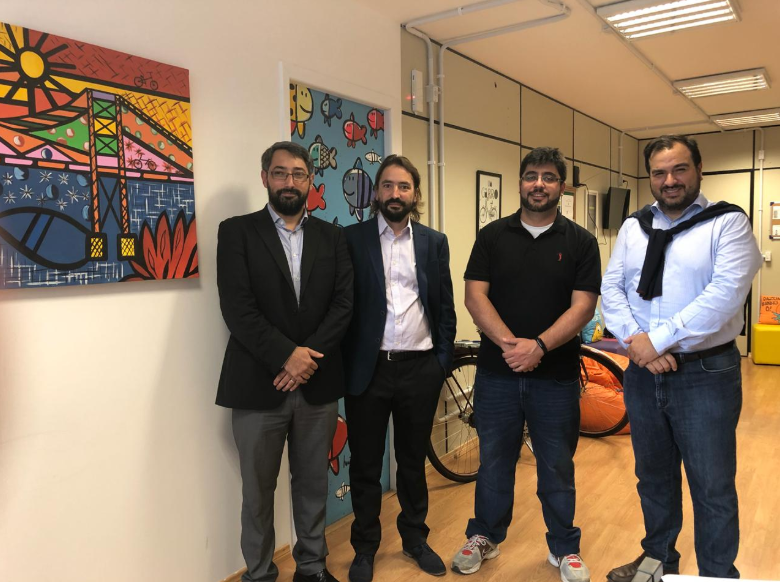
From left to right: Dr Pablo Salas, Dr Jean-Francois Mercure, Maikon Costa and Prof. Baltazar Guerra.
BRIDGE Events
Upcoming Event
Past Events
Seminars and Workshops
- 06/12/2018 - Cambridge, UK. Benny Dembitzer, presenting his new book ‘The famine next door. Africa is burning. The north is watching’.
- 19/09/2018 - Tubarão, Brazil. UNISUL Journey of Scientific Initiation JUNIC 2018
- 09/05/2018 – Santiago, Chile. Workshop with policy makers and academics
- 14/05/2018 – Santiago, Chile. Regional Political-Technical Dialogue on Energy, Water and Food Nexus
- 21/03/208 - Brasília, Brazil. Round-table debate ‘Mainstreaming the Water-Energy-Food Nexus through Policy Strategies of the NDC Processes’, University of Brasília and BRIDGE Consortium.
- 17/09/2018 & 22/09/2018 - Florianopolis and Pedra Branca, Brazil. Nexus courses for UNISUL undergraduate and graduate students
- 17/09/2018 & 20/09/2018 - Pedra Branca and Florianopolis, Brazil. TV interviews
- 26/06/2018 - Cambridge, UK. Food-Water-Energy Nexus Workshop at Newnham College.
- 02/05/2017 - Brasilia, Brazil. International Workshop on the Food-Water-Energy Nexus in Brazil – University of Brasilia and BRIDGE Consortium.
- 28/04/2017 - Tubarão, Brazil. Meeting with Researchers at UNISUL.
- 27/04/2017 - Florianópolis, Brazil. BRIDGE International Workshop.
- 05/04/2017 – Cambridge, UK. Seminar 'Food, Water, and Energy in the Context of Climate Change: Major World Challenges of the XXI century' by Benny Dembitzer.
Engagement with the Network of Stakeholders (Public and Private Sector)
-
27/09/2018 – Tubarão, Brazil. Inauguration of UNISUL Solar Hydroponic Greenhouse
- 27/09/2018 - Tubarão, Brazil. Meeting at the Tubarão City Council
-
25/09/2018 - Case Study on Policy Engagement: Florianopolis City Councelor Maikon Costa
- 21/09/2018 - Florianópolis, Brazil. Meeting at the Florianópolis City Council
- 20/09/2018 - Tubarão, Brazil. Stakeholder engagement session with ACIT, the business sssociation of Tubarão
- 03/05/2017 - Brasilia, Brazil. Meeting at the National Water Agency (Agencia Nacional de Aguas ANA)
- 02/05/2017 - Brasilia, Brazil. Meeting at the Brazilian Ministry of Mines and Energy.
- 01/05/2017 - Brasilia, Brazil. Meeting with Brazilian diplomats and prosecutor.
- 28/04/2017 - Tubarão, Brazil. Meeting at the Tubarão Mayor Cabinet and City Council.
- 27/04/2017 - Florianópolis, Brazil. Meeting with the President of the Legislative Assembly of Santa Catarina, Mr. Silvio Dreveck.
- 26/04/2017 - Florianópolis, Brazil. Meeting at the Florianópolis City Council.
Bridge to Impact
Bridge to Impact (B2I) – Accelerating Impact of the ESRC Project BRIDGE
Bridge to Impact (B2I) is a project designed to maximise the impact of the social science research developed under the project BRIDGE: Building Resilience In a Dynamic Global Economy - Complexity Across Scales in Brazil. The project has been funded by the Impact Acceleration Account (IAA) of the Economic and Social Research Council (ESRC). The team includes:
- PI : Dr Pablo Salas
- Co-I : Prof Jorge Viñuales
- Co-I : Prof Baltazar Guerra
Public Engagement
Public engagement in the BRIDGE project has been developed through an extensive network of stakeholders, which includes policy makers, private and third sector organisations. Based on the positive feedback obtained from the attendees to our previous engagement activities developed in BRIDGE, project B2I was designed to maximise its impact through the implementation of tailored activities for the BRIDGE network of stakeholders. Here we present a summary of the main events organised through B2I in UK, Brazil and Chile.
Engagement Events in UK
Energy-Water-Food Nexus Workshop at Newnham College, Cambridge, UK
The first B2I activity was a Nexus Workshop at Newnham College on the 26th of June of 2018. This event included the participation of all the Universities that are part of the BRIDGE project, including University of Cambridge, Radboud University, Open University and UNISUL. The event also included the participation of international guests, including:
- Dr Luiz Alberto da Cunha Bustamante, Legislative Advisor to the Federal Senate in Brazil.
- Secretary Pedro Tiê Cândido Souza, Brazilian diplomat, Head of the Environment and Climate Change Section, Embassy of Brazil in London.
- Claudio Bacigalupi, Head of Sector Water at European Commission Directorate for Development Cooperation.
- Benny Dembitzer, Cambridge Alumni and Economists, Managing Director of Grassroots Africa and member of the team awarded the 1985 Nobel Peace Prize on behalf of IPPNW (International Physicians for the Prevention of Nuclear Weapons).
This event was co-funded by the ‘Good’ Energy Policy - Small Grants Scheme. In that context, we took the opportunity to invite other groups from the University of Cambridge, to present their work in areas connected with the Nexus and look for potential partnerships:
- Prof Howard Griffiths, Co-Chair of the Cambridge University Strategic Initiative in Global Food Security.
- Dr Gemma Cranston and Eliot Whittington, from the Cambridge Institute for Sustainability Leadership (CISL), to present ‘The Nexus Network’.
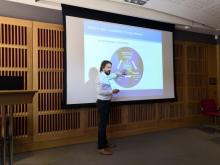
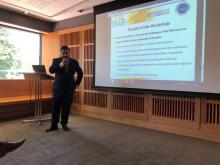
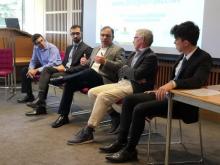
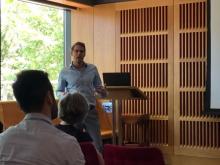
Nexus Seminar with UNISUL team and Benny Dembitzer
Taking advantage of an academic visit of the UNISUL team to Europe, we organised a special event on the 6th of December 2018. We invited Benny Dembitzer to present his new book: ‘The famine next door. Africa is burning. The north is watching’. The event included a series of seminars from the UNISUL team, presenting the work they have been doing on the Nexus in Brazil.
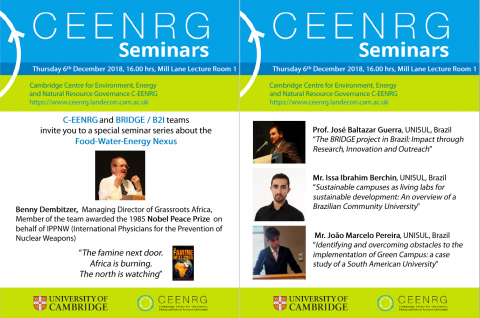
Engagement Events in Brazil
The main objective of the BRIDGE project is to ‘develop a framework of analysis and policy engagement to effectively inform and support the policy cycle in Brazil to reach objectives of sustainable development’ (BRIDGE proposal, 2015). Policy engagement in BRIDGE is being developed through an extensive network of stakeholders, which includes policy makers, private and third sector organisations in Brazil. In that context, B2I has been designed to maximise the impact of the BRIDGE network of stakeholders. Taking advantage of the annual visit of the BRIDGE team to Brazil, in September 2018, we organised a series of high impact events in Santa Catarina, including the cities of Florianopolis, Tubarão and Predra Branca. The events included stakeholder sessions with people from industry, policy makers, researchers and nexus courses for Brazilian students. A summary of these events is presented below.
Inauguration of the BRIDGE Pilot Project: Solar Hydroponic Greenhouse
On the 27th of September 2018, in the city of Tubarão, we had the inauguration of the Solar Hydroponic Greenhouse, one of the BRIDGE Pilot Projects. The event was attended by approximately 30 people, including the President of the Santa Catarina State Research and Innovation Funding Agency (FAPESC), Tubarão City Counselors, BRIDGE researchers, UNISUL students and general public.
A very special guest in the event was a group of students from the local primary school ‘Coração Feliz’ (it translates as ‘Happy Heart School’). The students from the primary school are working in a miniature representation of the UNISUL’s solar greenhouse, for a robotic competition, to produce vegetables in outer space (thinking on a future colonisation or Mars). The interaction between BRIDGE researchers and the local school is part of the continuous engagement process fostered by BRIDGE.
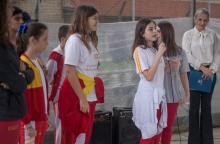
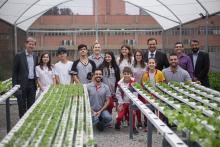
Among the attendees, were the President of FAPESC, Prof. Guilberto Agnolin, and the Director of Administration of FAPESC, Dr Walter Gomes. FAPSEC is the Foundation for Research and Innovation Support of the State of Santa Catarina, the funding body supporting the BRIDGE project under the Newton Fund.
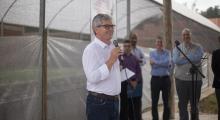
Below, we can see some articles in the local press regarding the solar greenhouse:
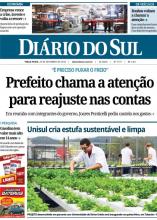
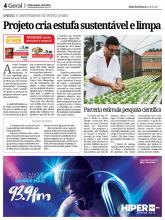
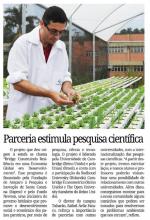
The hydroponic solar greenhouse was developed as an alternative food production method, using only 10% of the water used by traditional methods, and renewable energy from solar panels. The food produced by the greenhouse is partly sold at the UNISUL campus in Tubarão, and partly donated to local schools and charities. The solar greenhouse is also used for research on how to improve food production efficiency, strengthening food security.
Following the success of this pilot project, C-EENRG, UNISUL and UFSC applied for funding at the Research England GCRF QR Funding 2018-19 University of Cambridge call. They received funding for building a new solar hydroponic greenhouse to install it in a vulnerable community of Santa Catarina. The project, called ‘BRIDGE-TESC - Technological Empowerment for family-farming agriculture in Santa Catarina’, will monitor the production of food in the greenhouse, using cutting-edge ‘Internet of Things’ (IoT) technology. Moreover, the engineering departments of UNISUL and UFSC will develop a new programme for their engineering students, so they can develop low-cost technological solutions for agriculture in Santa Catarina, using the infrastructure deployed in BRIDGE-TESC.
Case Study on Policy Engagement: Florianopolis City Councelor Maikon Costa
A crucial aspect of the BRIDGE project is the work we do on policy engagement, especially at the local level in Santa Catarina. Professor Baltazar Guerra, the BRIDGE PI in Brazil, has been working with local policy makers for more than a decade, addressing sustainability issues at the city, state and federal levels.
A particularly successful collaboration has been taking place with Florianopolis City Councelor Maikon Costa. Maikon has supported the organisation and delivery of BRIDGE project activities in Florianopolis, including the international workshop of 2017, where the Nexus challenges of Brazil were discussed in detail.
In September 2018, Dr Pablo Salas and Prof. Baltazar Guerra interviewed Maikon Costa, to know more about his work on sustainability, his connection with the BRIDGE project and the influence of BRIDGE on his 'Urban Farming' bill proposal at the Florianopolis City Council. The interview can be found in the following link.
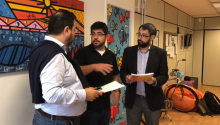
Business Association of Tubarão - ACIT
Private sector engagement is crucial for the creation for awareness, and to foster changes of attitude and behaviour from companies. Working in this direction, on the 20th of September 2018, we organised a special stakeholder engagement session for ACIT, the Business Association of Tubarão (Associação Empresarial de Tubarão/SC. https://www.acittubarao.com.br). ACIT ‘represents businesses in the industrial, commercial and service sectors’ in Santa Catarina. The session was opened by the Mayor of Tubarão, Mr. Joares Carlos Ponticelli, and the President of ACIT, Mr. Edson Martins Antônio. The event included the participation of several companies from the region, especially from the energy and mining sectors.
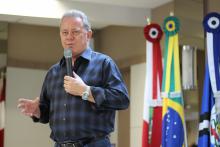
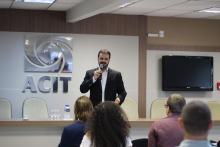
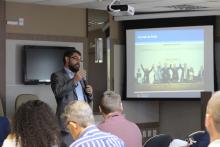
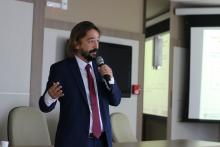
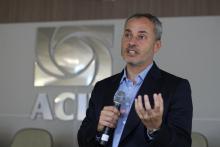
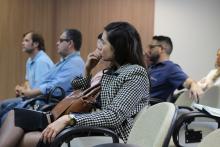
Florianopolis City Council
Building on the engagement events organised in 2017, our team organised a follow-up session at the Florianopolis City Council on the 21st of September 2018. The session was presided by City Counsellor Guilherme Botelho, and had the participation of several council members as well as Dr Walter Gomes, Director of Administration of FAPESC.
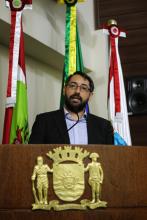
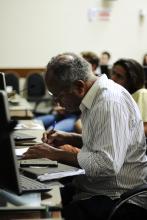
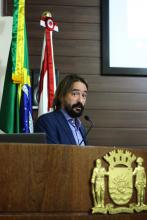
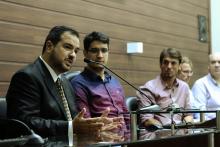
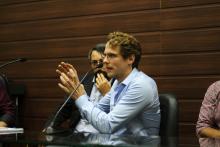
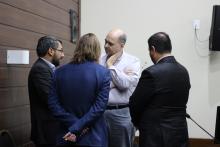
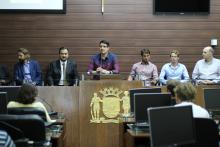
Nexus courses for UNISUL undergraduate and graduate students
B2I included the organisation of a series of short nexus courses, for students in the following programmes:
- Undergraduate Programme on Management and International Relations, UNISUL.
- Graduate Programme on Management and Environmental Sciences, UNISUL.
- Undergraduate Programme on Regional Development of the State of Santa Catarina
The courses included an introduction to climate change, and its impact on the energy-water-food nexus. The topics were addressed first from a global perspective, and later a more detailed view of the specific challenges in Brazil were analysed.
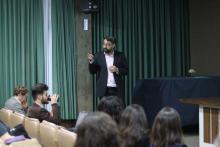
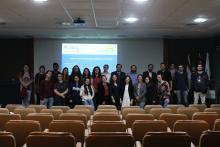
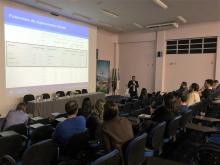
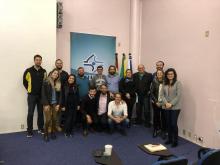
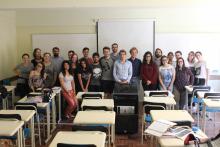
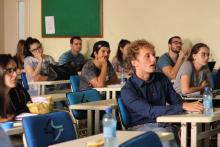
Interviews in Local Television
The BRIDGE team took the opportunity to talk to the local press, regarding global sustainability issues and to describe the work we have been doing in Brazil. One interview took place in the programme ‘Education and Citizenship’ at RecordNews. The other interview was recorded for the programme ‘Big Issues’ at UNISUL TV, a local TV station run by the press department of UNISUL.
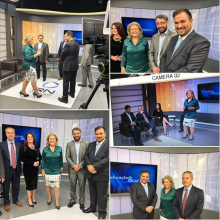
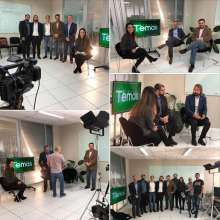
Tubarão City Council
On the 27th of September 2018, the same day we inaugurated the solar hydroponic greenhouse, we organised a meeting with representatives of the Tubarão City Council. The goal of the meeting was to discuss with the City Council the work being developed under the BRIDGE project. In particular, our conversation focused on the work done in the design and development of a solar hydroponic greenhouse in the city of Tubarão, and how we can work together with the City Council to maximise its impact in the local community.
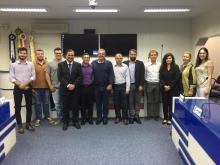
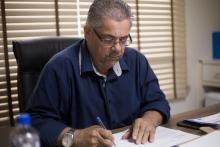
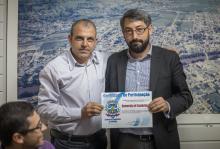
Conference
Our visit to Brazil was planned so we could participate in the conference ‘JUNIC 2018: UNISUL Journey of Scientific Initiation’ (JUNIC stands for 'Jornada UNisul de Iniciação Científica'). The JUNIC promotes integration and debates between different research groups of UNISUL, and its main topic this year was research internationalisation. The event had more than 300 attendees, from all the different research groups of UNISUL. It included presentations from FAPESC and CAPES, the Brazilian federal government agency responsible for quality assurance in undergraduate and postgraduate institutions in Brazil.
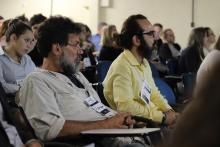
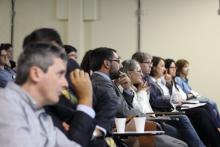
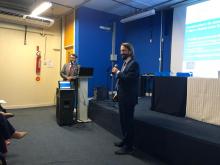
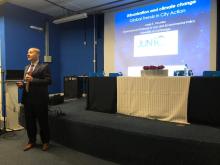
Engagement Events in Chile
Workshop with policy makers and academics, Santiago, Chile
On the 9th of May 2018, Pablo Salas and Hector Pollitt led the Workshop on Climate Policy Analysis for Chile. This workshop was organised in the context of the 'Global Carbon Market' and the 'Partnership for Market Readiness' projects of the Chilean Ministry of Energy and the German Corporation for International Cooperation (GIZ - Deutsche Gesellschaft für Internationale Zusammenarbeit). The workshop gathered experts from both the public and private sectors to discuss the creation of a new modelling and simulation tool to assess potential future climate policy. Additional to the workshop, GIZ and the Ministry supported the organisation of a series of interviews with key policy-makers from different governmental departments connected with climate policy. Based on the results of the workshop and the interviews, Cambridge Econometrics provided the basis for the design of a new modelling and simulation tool to assess potential future climate policy in Chile, whilst Pablo Salas provided insights about the Chilean legal, economic and social contexts.
Based on the results of this collaboration, the Chilean Government produced the Terms of Reference for the implementation of a new modelling and simulation tool to assess potential future climate policy in Chile.
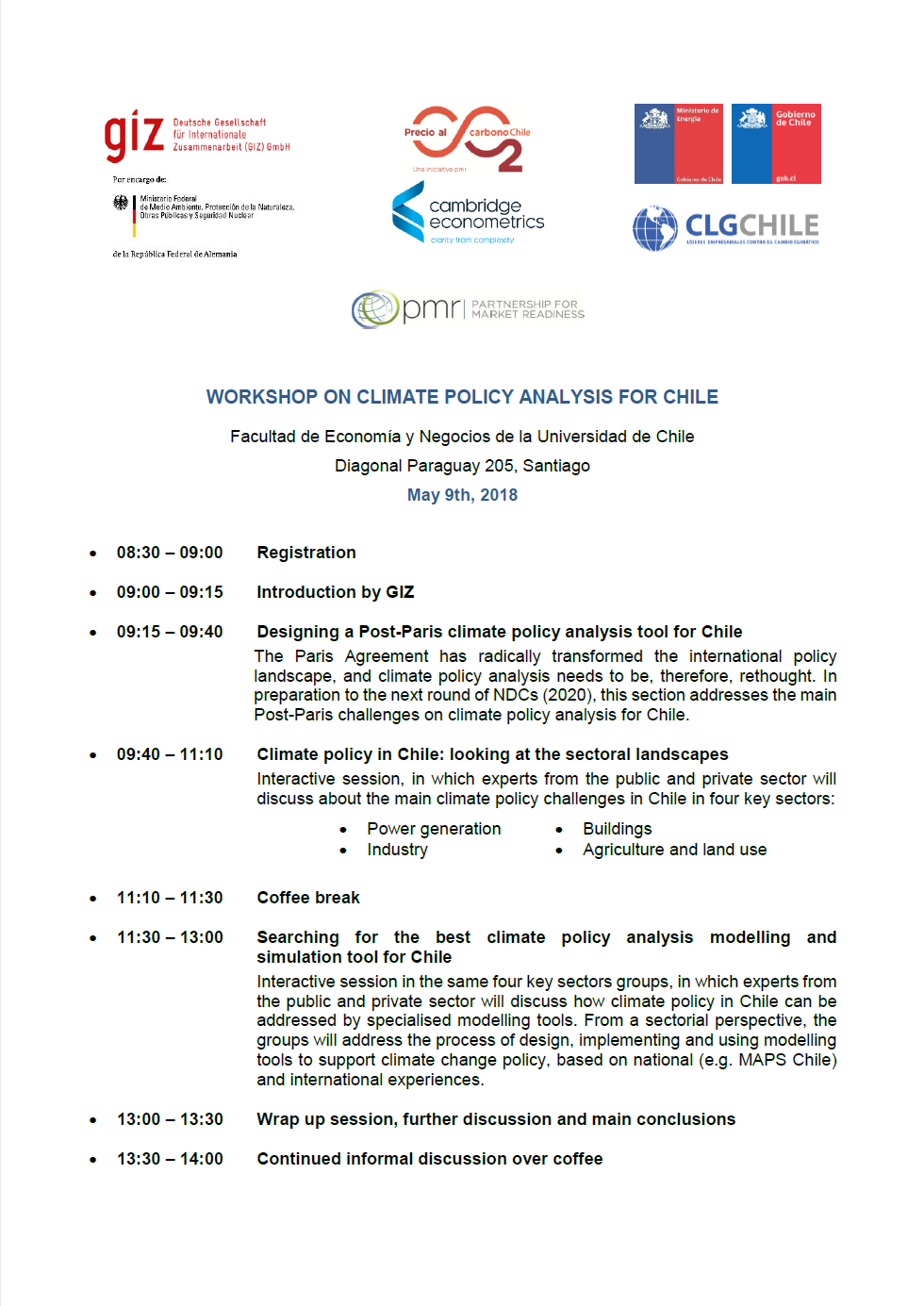
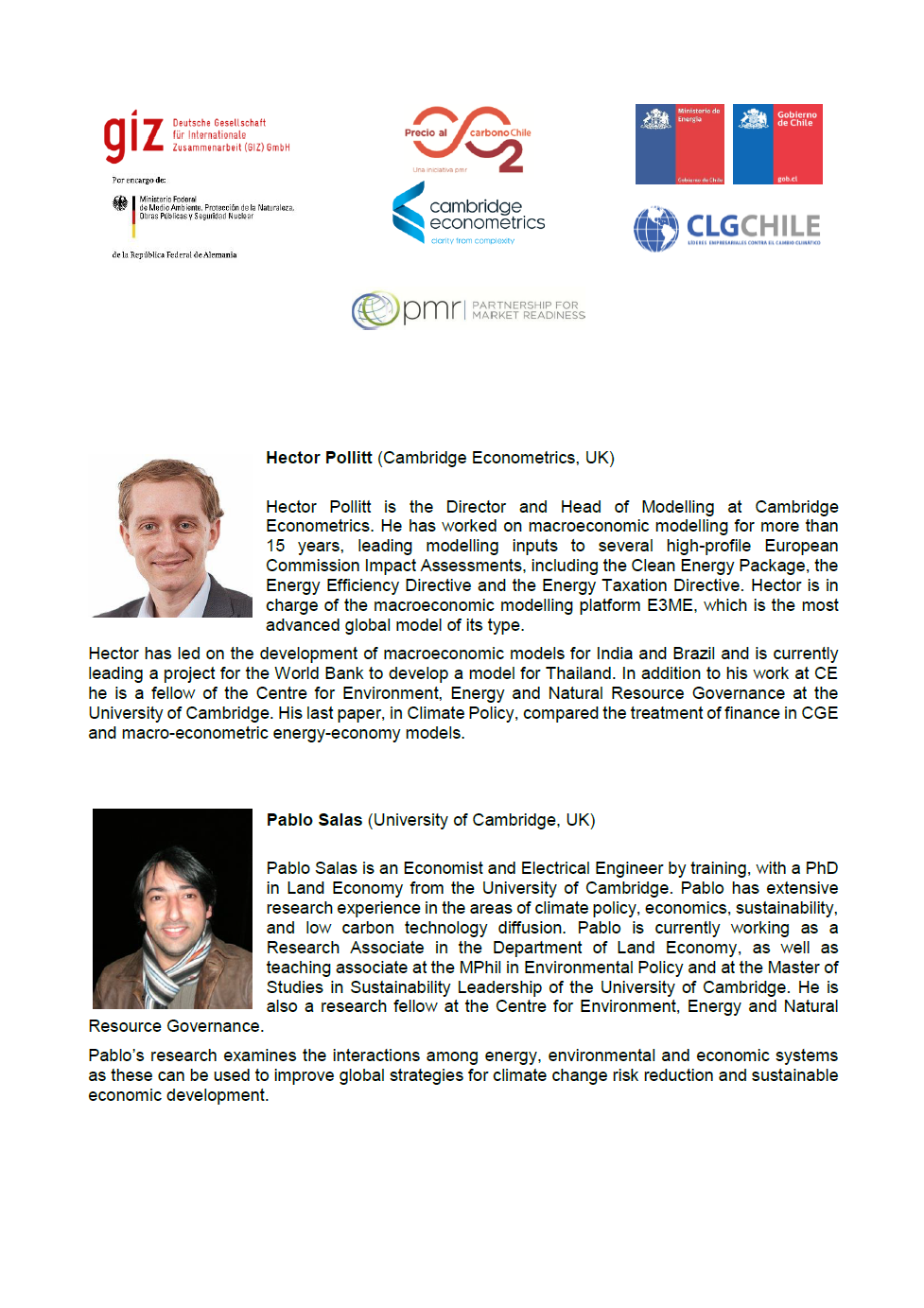
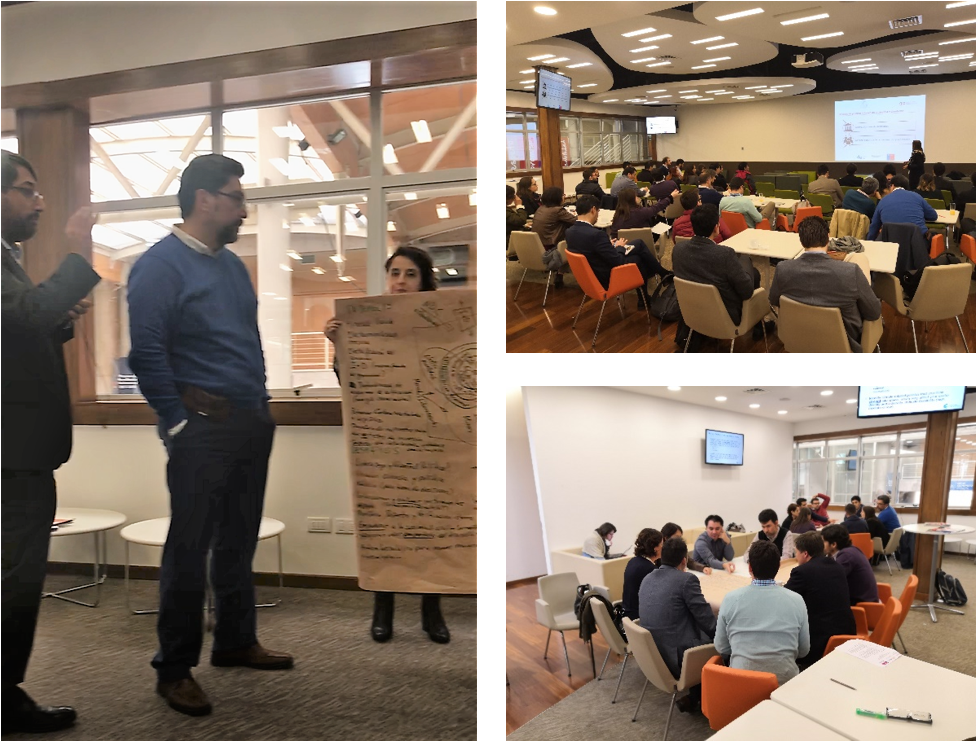
Regional Political-Technical Dialogue on Energy, Water and Food Nexus, ECLAC, Santiago, Chile
On the 14th of May 2018, Pablo Salas presented the BRIDGE project at the 'Regional Political-Technical Dialogue on Energy, Water and Food Nexus'. This event was organised by the UN Economic Commission for Latin America and the Caribbean (ECLAC), and it was held at the ECLAC headquarters in Santiago, Chile. The conference was focused on the connections between the energy-water-food nexus, the Sustainable Development Goals (SDG) and the challenges associated to implement nexus policies in Latin America. The trip to Chile was kindly co-funded by the 'Good' Energy Policy - Small Grants Scheme.
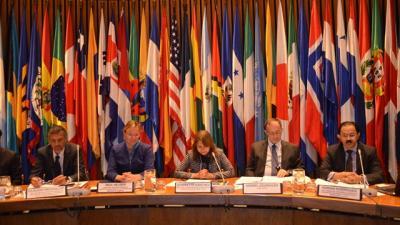
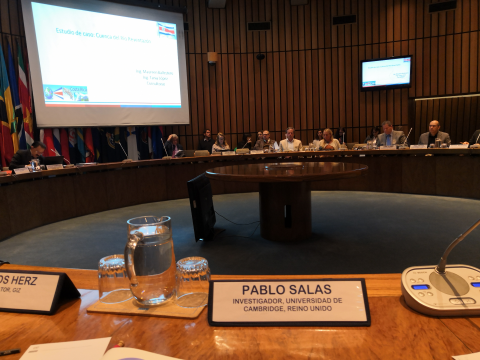
BRIDGE-TESC
The project BRIDGE-TESC brings together an international team of experts from academia and private sector to work in the co-development of technological solutions that can help to close the technology access gap in the agricultural sector in the State of Santa Catarina (Brazil).
BRIDGE-TESC: Technological Empowerment for family-farming agriculture in Santa Catarina
BRIDGE-TESC is a pilot project that brings together an international team of experts from academia and private sector to work in the co-development of technological solutions that can improve agricultural and industrial processes in the State of Santa Catarina (Brazil). The project includes three universities and a start-up: University of Cambridge (UK), University of the South of Santa Catarina (UNISUL, Brazil), Federal University of Santa Catarina (UFSC, Brazil) and Camnexus Ltd., a UK start-up. The project has four team leaders, one from each institution:
- PI: Dr Pablo Salas (C-EENRG, University of Cambridge, UK)
- Co-I: Dr Jessica Ocampos (Camnexus Ltd, UK)
- Co-I: Prof Baltazar Guerra (UNISUL, Brazil)
- Co-I: Prof Cristiane Derani (UFSC, Brazil)
About the Project
The project BRIDGE-TESC gathers multidisciplinary expertise to tackle the technology access gap currently existing in the family-farming sector of Santa Catarina (SC). The project builds on the already successful multidisciplinary and equitable research partnership between C-EENRG, UNISUL, UFSC and Camnexus under the research project BRIDGE, which focuses on the resilience of the Brazilian Food-Water-Energy nexus to global environmental and economic change.
BRIDGE-TESC has three main objectives:
- Support the sustainable and low-cost production of food using a solar hydroponic greenhouse prototype developed by UNISUL in BRIDGE.
- Support the improvement of agricultural practices in SC by implementing a prototype 'Internet of Things' (IoT) sensor network for agriculture. The data from the environmental variables obtained with this network will be used by the research partners to improve agricultural practices in vulnerable communities of the region.
- Improve the competitiveness of family farming in SC by closing the technology access gap and by fostering the implementation of local technology. The project fosters the development of specialised low-cost ICT technologies for improving agricultural productivity by engineering students of UNISUL and UFSC.
Figure 1 presents a diagram with the main components of the project. With the support of the University of Cambridge (top right), the two Brazilian universities, UNISUL and UFSC, joined efforts to implement an IoT network with gateways in two cities: Florianopolis (UFSC, bottom right) and Tubarão (UNISUL, bottom left). The implementation of the IoT network was led by Camnexus (centre of the diagram), using its early stage prototype network based on LoRaWAN technology. The network in Tubarão includes nodes installed in the solar hydroponic greenhouse prototype developed by UNISUL under the project BRIDGE (bottom left). A smaller scale greenhouse, with IoT technology in it, will be installed in a public school in Tubarão (top left), and its impact will be studied by researchers from DESIS (Centre for Studies on Sustainable Economic Development and Social Innovation) at UFSC.
In 2018, UFSC was awarded with the CAPES-PrInt programme, a project funded by CAPES - the Coordination of Improvement of Higher Education Personnel - to support the internationalisation of research at UFSC (hence the name, CAPES - Project for Internationalisation or ‘PrInt’). C-EENRG is one of the international partners of the CAPES-PrInt programme. In this context, the platform being developed under BRIDGE-TESC is expected to remain operative beyond the end of the project, with the support of the ongoing CAPES-PrInt (2019-2022) of UFSC (middle right of the diagram).

Diagram explaining the main components of the project BRIDGE-TESC.
The details about the pilot and the role of each partner of the project are described below. First, we describe the deployment of the IoT network in Santa Catarina, specifically in the cities of Tubarão and Florianopolis. Second, we describe the capability building work developed after the infrastructure was deployed, within UNISUL and UFSC. Third, we describe the work to be done in a local school in Tubarão in a combined effort UNISUL-UFSC. And finally we describe some of the future opportunities this project can bring.
Deployment of the IoT Network
UINISUL Tubarão and the solar hydroponic greenhouse
In 2018, the University of the South of Santa Catarina (UNISUL) designed and implemented a solar hydroponic greenhouse in its main campus located at the city of Tubarão. This implementation was one of the BRIDGE pilot projects, which aimed to evaluate a more sustainable production of food using solar power and minimising the use of fresh water. In BRIDGE-TESC, we proposed to use the IoT sensor network developed by Camnexus for monitoring the performance of the greenhouse for research purposes. The installation of the IoT network in UNISUL took place in June 2019, under the lead of UNISUL Professors Baltazar Guerra and Celso Albuquerque.
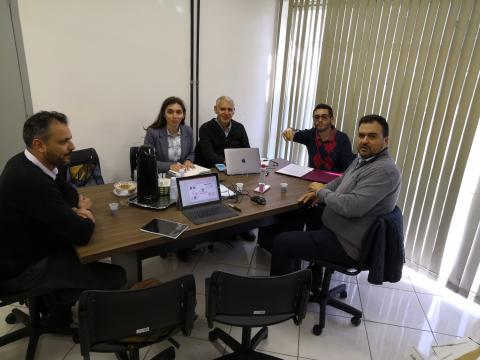
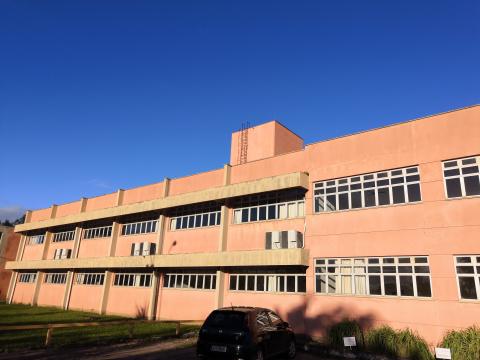
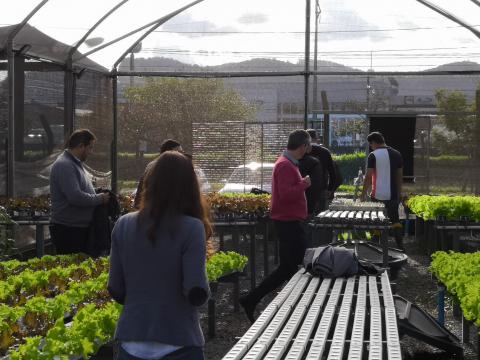
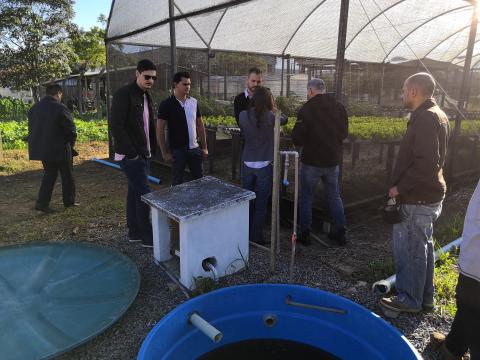
Meeting and technical visit in preparation for the installation of the IoT network in Tubarão. Top left: Meeting at UNISUL. From right to left Prof. Baltazar Guerra (UNISUL), Prof Celso Albuquerque (UNISUL), Juan Carlos Ocampos (Camnexus), Dr Jessica Ocampos (Camnexus), Prof. Juliano Cesconeto (UNISUL) and Dr Pablo Salas (C-EENRG, taking the photo). Top right: UNISUL building identified as the best option to install the IoT antenna. Bottom row: Technical visit to the solar hydroponic greenhouse before the installation.
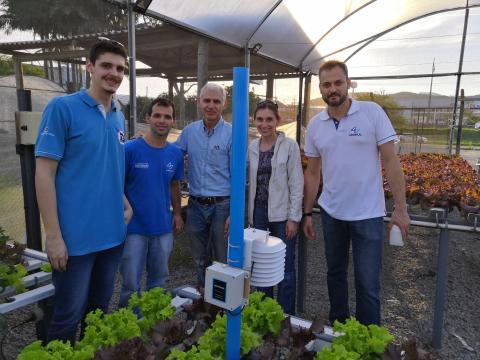
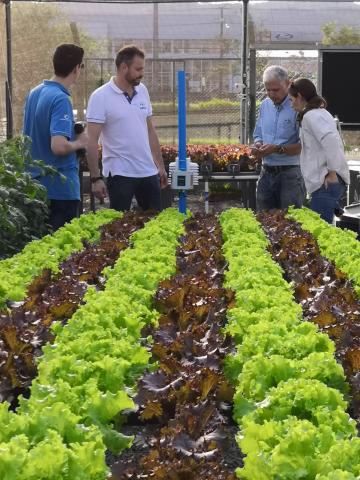
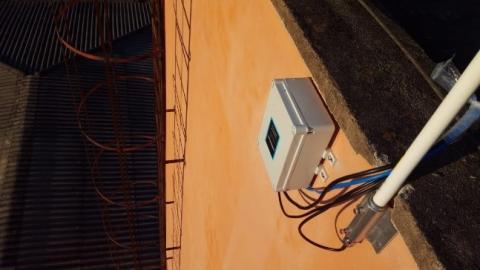
Installation of the IoT equipment at UNISUL Tubarão. Top left: Team that installed the meteorological station within the solar hydroponic greenhouse. From right to left Prof. Juliano Cesconeto (UNISUL), Dr Jessica Ocampos (Camnexus), Juan Carlos Ocampos (Camnexus) and Rafael Durante (UNISUL). Right: The team looking at the data from the meteorological station in the mobile phone, after the installation. From right to left Dr Jessica Ocampos, Juan Carlos Ocampos, Prof. Juliano Cesconeto and Rafael Durante. Bottom left: gateway and antenna installed at the top of the building showed in the pictures above.
Currently, the solar hydroponic greenhouse at Tubarão is being monitored remotely, using the IoT network. Since the beginning of its operation (June 2019), the pilot in Tubarão is providing real-time data of the greenhouse's internal climate, in-feed water quality and nutrients, and irrigation water level. Data processing and alerts have helped improvement of practices in the daily operation with impact in savings and productivity of the hydroponic farm.
UFSC Florianopolis
The IoT network has another gateway installed at the main campus of the Federal University of Santa Catarina (UFSC), in the city of Florianopolis. The installation took place at the top of the Technology Centre of UFSC (CTC Building, see pictures below). The work was led by Juan Carlos Ocampos from Camnexus. The team was supported by Gabriel Manoel and Beto, under the coordination of Prof. Carlos Montez, all of them from UFSC. Prof. Montez is the technical counterpart of UFSC within the project BRIDGE-TESC.
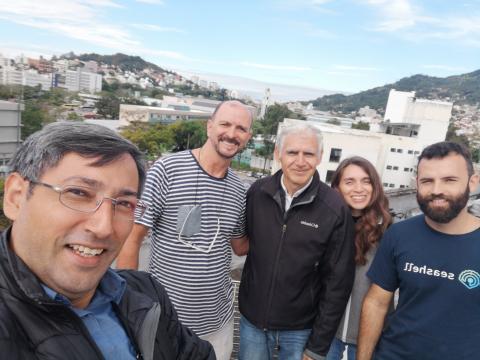
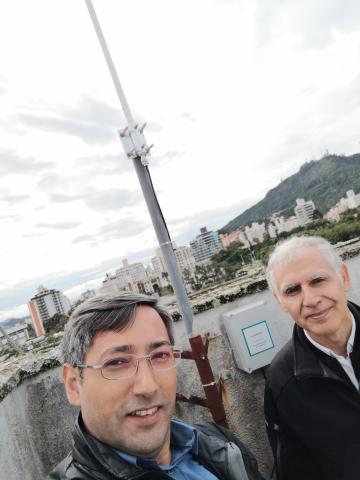
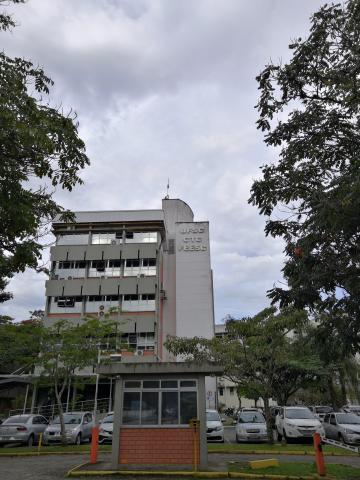
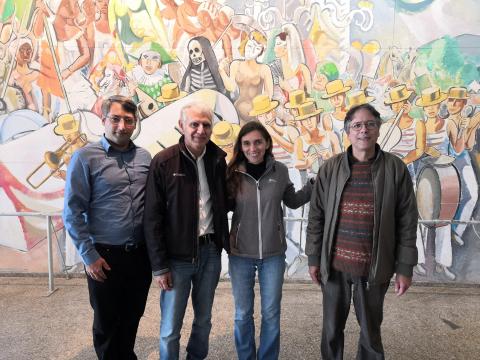
Installation of the IoT antenna within the UFSC campus at Florianopolis. Top: the team doing the installation. From right to left Gabriel Manoel (UFSC), Dr Jessica Ocampos (Camnexus), Juan Carlos Ocampos (Camnexus), Beto (UFSC) and Dr Pablo Salas (C-EENRG). Middle left: Juan Carlos Ocampos and Dr Pablo Salas posing in front of the installed gateway and antenna. Middle right: Picture of Beto (at the top of the building) working in the installation of the antenna. Bottom: Picture with Professor Carlos Montez (UFSC) who is the technical counterpart of USFC within BRIDGE-TESC and coordinated the installation work.
Training
Aiming to close the technology access gap in Santa Catarina, the project BRIDGE-TESC included capacity building sessions for engineering students at UNISUL and UFSC. The idea is to develop pilots training that will become part of permanent engineering courses. In this way, academic and students of UNISUL and UFSC can make use of the infrastructure, that will remain after the end of the project. The long-term objective is to create the training tools for the new generations of engineers, so they can keep working on the improvement of agricultural and industrial processes in Santa Catarina.
Training at UNISUL
Prof. Juliano Cesconeto became the technical counterpart in charge of the IoT infrastructure at UNISUL. With the help of the students Rafael Durante (electrical engineering) and Romulo Moya (agronomy), Prof Cesconeto and the team of Camnexus (Dr Jessica Ocampos and Juan Carlos Ocampos) installed, configured and tested the IoT equipment at the UNISUL campus of Tubarão. The team of Prof Cesconeto received direct training from Camnexus regarding each of the equipment installed at UNISUL, as well as the software platform being used for extracting the data.
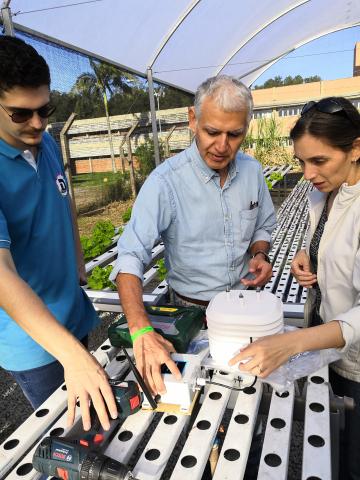
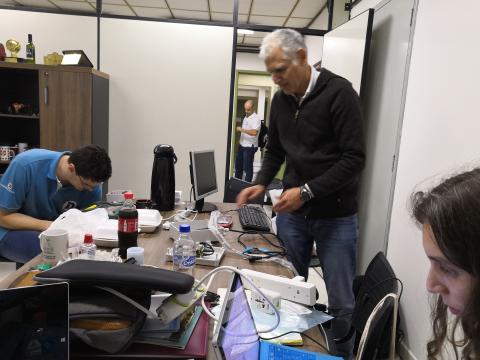
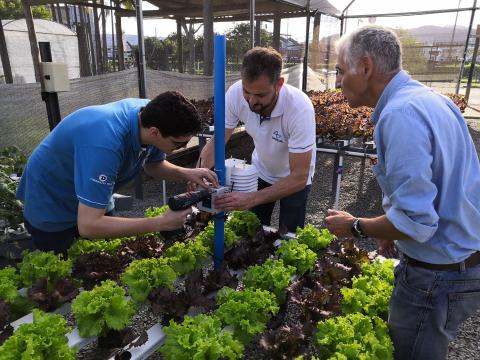
The team of Prof Cesconeto working together with Camnexus in the installation of the IoT network at UNISUL.
With the IoT equipment installed at UNISUL, the next step was to train the potential users of the platform. With this purpose, a training session was organised by Prof Celso Albuquerque and by Prof Francisco Duarte de Olivera, coordinator of Electrical Engineering at UNISUL. More than 60 students and academics attended the workshop.
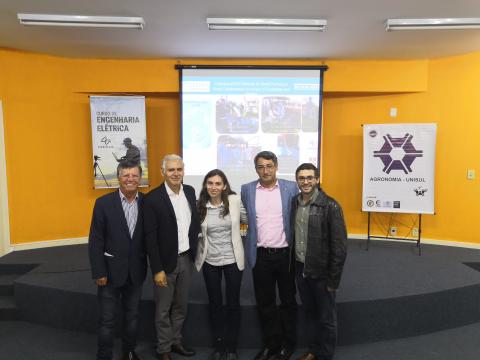
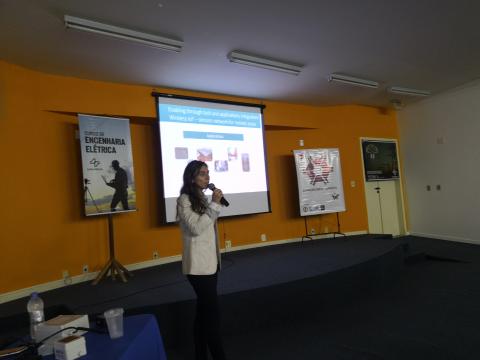
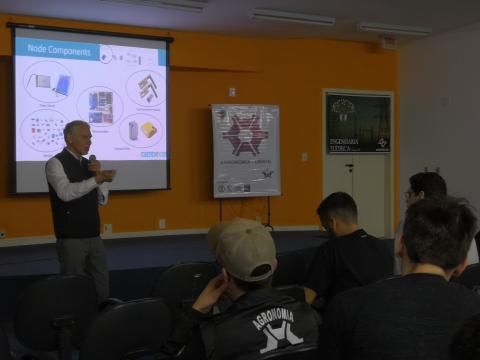
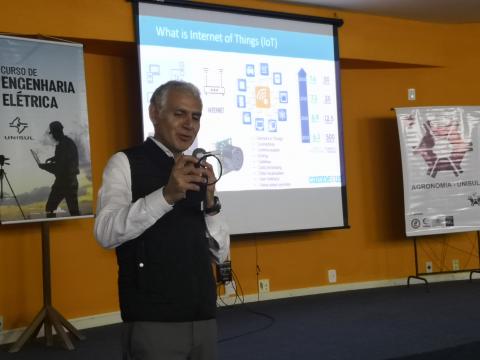
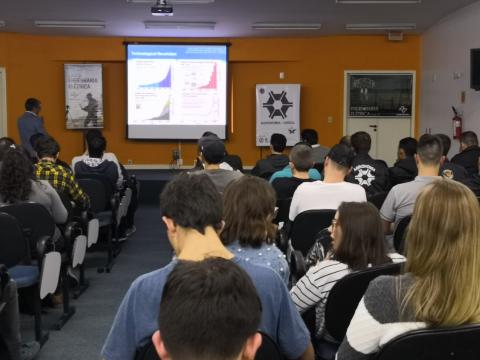
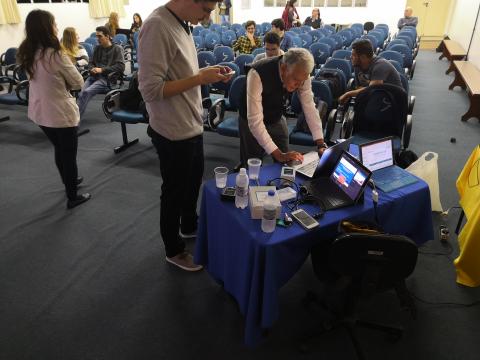
BRIDGE-TESC training session prepared for the academics and students of UNISUL. Bottom right: Juan Carlos Ocampos (Camnexus) and Rafael Durante (UNISUL) preparing the equipment. Bottom left: Session by Dr. Pablo Salas (C-EENRG). Middle right and left: Session by Juan Carlos Ocampos. Top right: Session by Dr Jessica Ocampos (Camnexus). Top left: organising team, from right to left Prof Celso Albuquerque (UNISUL), Dr Pablo Salas, Dr Jessica Ocampos, Juan Carlos Ocampos and Prof Francisco Duarte de Olivera (UNISUL).
Training at UFSC
At the Technology Centre (CTC) of UFSC, within the Department of Automation and Systems and the Department of Electrical and Electronic Engineering, there are several academics working on the development of IoT technology. Based on the existing capability, in BRIDGE-TESC we designed tailored training sessions for different levels of users:
- An introductory session for the leaders of the CAPES-PrInt programme. In particular, the leaders from the ‘Digital Transformation: Industry 4.0 and Services’, ‘Human Health’ and ‘Environmental Sustainability’ were invited to know more about the project, so they could identify potential areas of research collaboration using the new IoT platform. This session was organised and presided by the Director of the CAPES-PrInt programme, Prof Cristiane Derani, who is the Co-I of BRIDGE-TESC.
- An intermediate and an expert hands-on session for people interested or with experience working with IoT devices. These sessions were organised by Prof Ricardo Rabelo, Prof Max Queiroz and Prof. Carlos Montez, all of them from the Department of Automation and Systems.
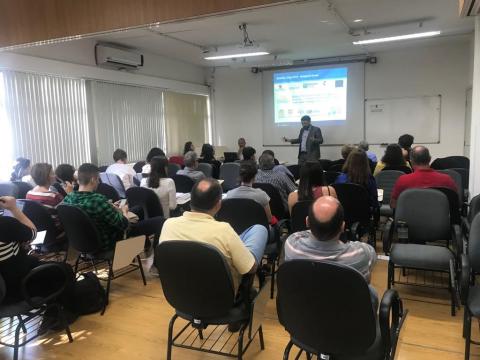
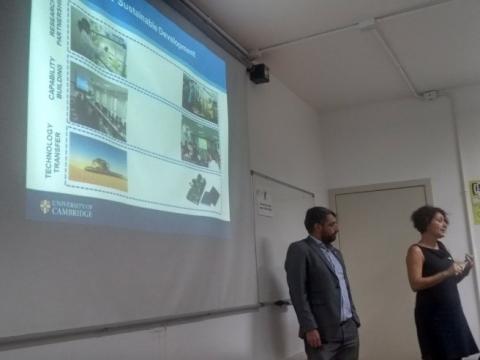
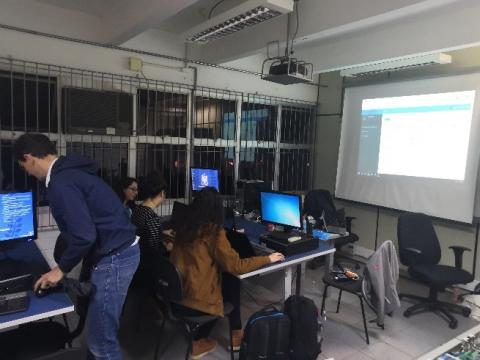
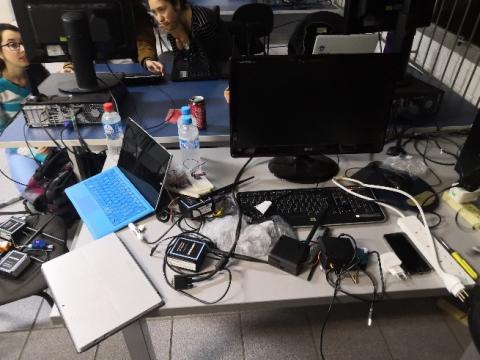
Top row: Introductory session for the leaders of the CAPES-PrInt programme at UFSC. The session was organised by Prof Cristiane Derani (top left picture), Director of the CAPES-PrInt programme and Co-I of BRIDGE-TESC. Bottom row: Training sessions for intermediate and advanced users of IoT. The sessions took place at the laboratory of the Department of Automation and Systems, organised by Prof. Ricardo Rabelo, Prof Max Queiroz and Prof. Carlos Montez.
Research programme with local school
One of the goals of BRIDGE-TESC is to have an impact in the local community, beyond the academic partners UNISUL and UFSC. As shown in figure 1, the project includes the installation of a small-scale replica of the solar hydroponic greenhouse of UNISUL in a public school in Tubarão, complemented with IoT equipment to measure its performance. The team at DESIS - Centre for Studies on Sustainable Economic Development and Social Innovation - at UFSC prepared a research programme to be developed in parallel with the installation of the equipment. The research programme aims to identify the social impacts that the technological intervention will have in the local community connected to the school. The research at the school will be directed by Prof Edison da Rosa, Director of DESIS, with the help of Debora Bernett. The programme will be implemented in close coordination with the team at UNISUL, which is leading the implementation of the new solar hydroponic greenhouse at the local school, under the direction of Prof Baltazar Guerra (Co-I of BRIDGE-TESC) and Prof Celso Albuquerque Junior (UNISUL).
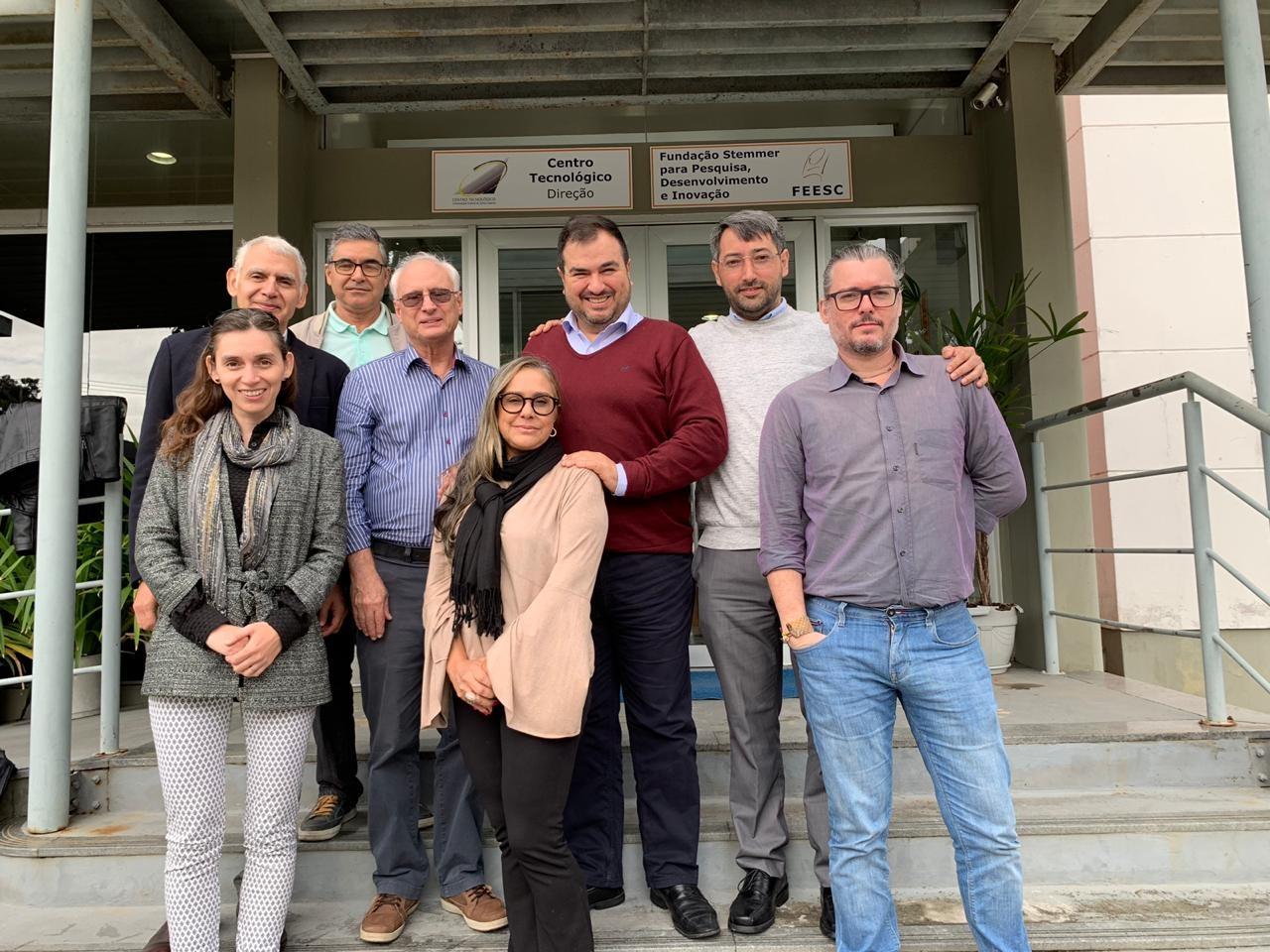
Meeting with Prof Baltazar Guerra and the DESIS team, to coordinate the research programme with the local school. From bottom left to right, front row: Dr Jessica Ocampos (Camnexus), Debora Bernett (DESIS), Eduardo Cruz (DESIS). Middle row: Juan Ocampos (Camnexus), Prof Edison da Rosa (DESIS), Prof. Baltazar Guerra (UNISUL), Dr Pablo Salas (C-EENRG). Back row: Vicente Sandrini Pereira (DESIS).
Identification of new opportunities, beyond BRIDGE-TESC
The long-term objective of BRIDGE-TESC is to improve the competitiveness of family farming in SC by closing the technology access gap and by fostering the implementation of local technology. Working in this direction, BRIDGE-TESC included a series of meetings with strategic stakeholders, to search for potential collaboration opportunities. Some of these activities are described below.
Workshop with UFSC researchers leading the CAPES-PrInt programme
Following the introductory session for the leaders of the CAPES-PrInt programme (see section 'Training at UFSC' above), a tailored workshop was designed for the groups that could be particularly benefited form using the infrastructure developed under BRIDGE-TESC. The attendees included people from Computing Sciences, Food Engineering, Aquaculture and Power Electronics. The workshop included a detailed description of the infrastructure developed under BRIDGE-TESC, and a group working session to identify specific ways in which the attendees could use the infrastructure in their respective research areas. The workshop finished with a discussion of potential funding opportunities, for local (Brazil) as well as international research projects.
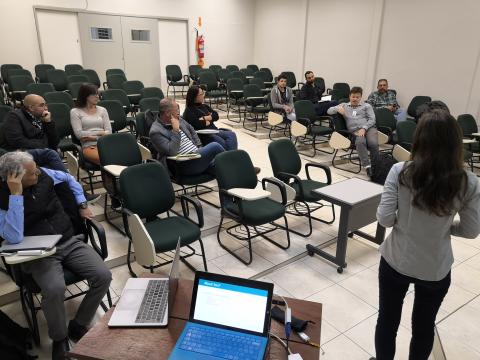
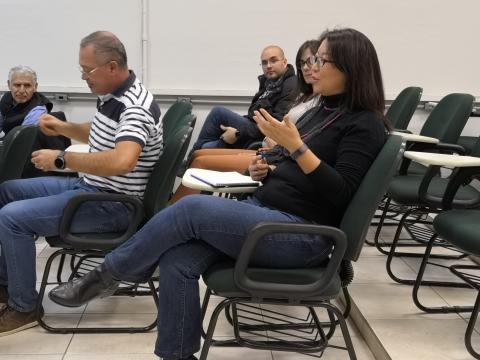
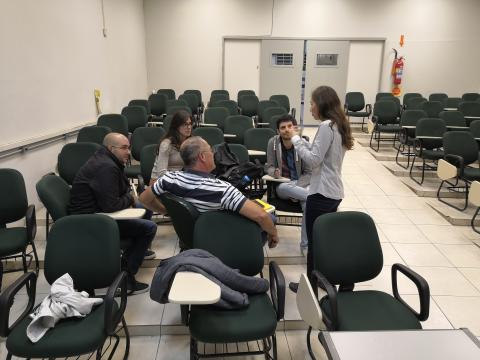
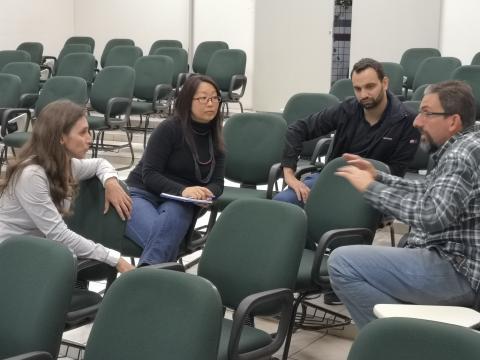
Workshop session with researchers that could be particularly benefitted by the BRIDGE-TESC infrastructure at UFSC.
The researchers attending the workshop were mostly from campuses located in the island of Florianopolis. Another group of researchers from UFSC Ararangua (220 km to the South of Florianopolis) was interested in attending the workshop, to learn how they could use the IoT network developed under BRIDGE-TESC in their research projects. Unfortunately, due to the geographical limitations, they were not able to attend. Consequently, we organised a skype session with them, to explain how they could make use of the platform, and how potential collaborations could be developed.
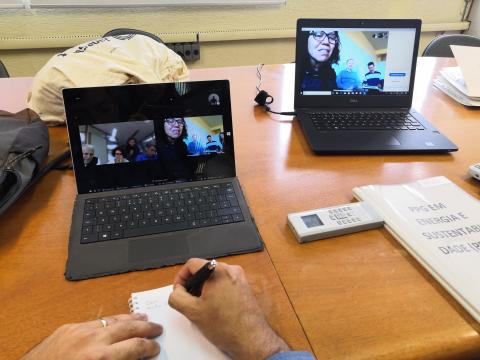
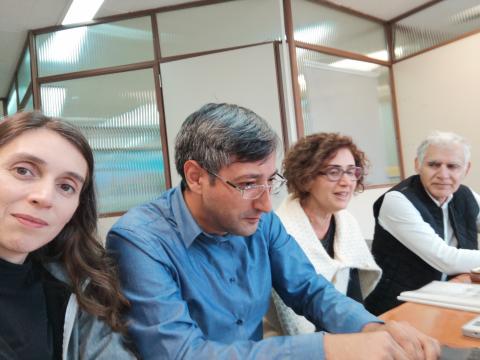
Skype meeting with the CAPES PrInt team of UFSC Ararangua. The meeting was presided by Prof Cristiane Derani, Director of the CAPES PrInt programme at UFSC and Co-I of BRIDGE-TESC.
Visit to the Power Electronics Institute at UFSC
The tailored workshop described in section 5.1 helped us to identify ways in which the team at the Power Electronics Institute (INEP, UFSC) could benefit from the infrastructure developed by the BRIDGE-TESC project. After attending the CAPES PrInt workshop, Prof Andre Luis Kirsten invited us to the INEP lab. There, he showed us the systems UFSC is developing to solve some of the challenges of the energy industry at Santa Catarina. After the visit, it became clear that the technological solutions being developed at INEP could be enormously benefitted by adding the IoT telecommunication layer developed within the BRIDGE-TESC project. Thanks to the workshop and the meeting, now specific collaboration opportunities are being discussed between the different partners.
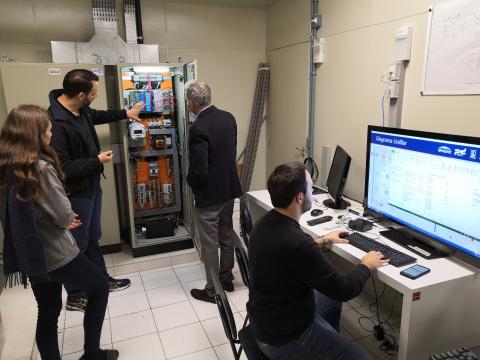
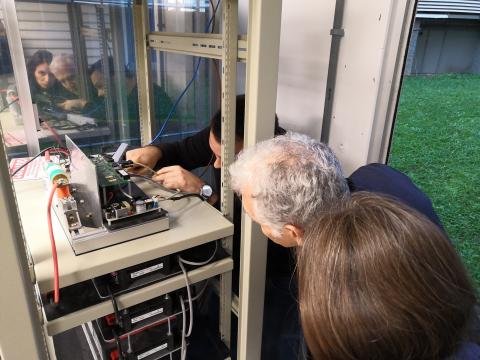
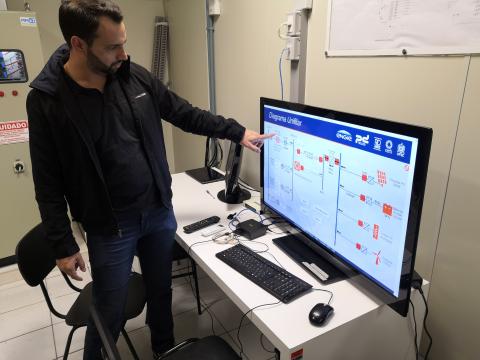
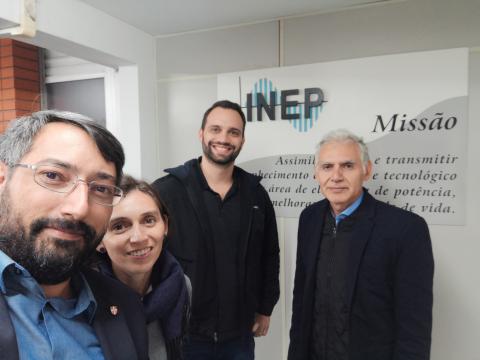
Visit to the laboratory of the Power Electronics Institute (INEP) at UFSC, to discuss specific ways in which they could be benefited by using the infrastructure developed under BRIDGE-TESC. Visit organised by Prof Andre Luis Kirsten.
Engaging with the wider innovation ecosystem of Santa Catarina
Taking advantage of the extensive networks of stakeholders of UFSC and UNISUL, we decided to present the project BRIDGE-TESC to two relevant stakeholders of the Santa Catarina’s innovation ecosystem: ACATE – the Santa Catarina Association of Technology Companies – and SEBRAE – the Brazilian Service of Assistance to Micro and Small Enterprises. Both groups share a common goal with BRIDGE-TESC: closing the technology access gap of Santa Catarina. ACATE and SEBRAE showed great interest in the technological platform created through BRIDGE-TESC, because it can provide direct benefits to its members. Therefore, we agreed in pursuing further conversations to search for potential collaborations.
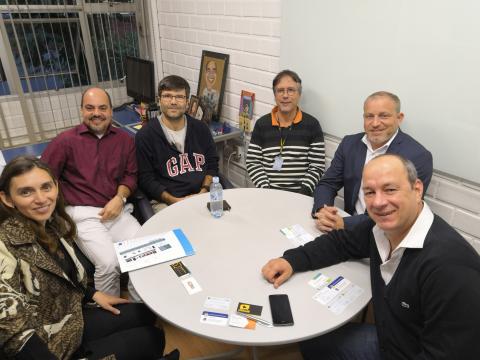
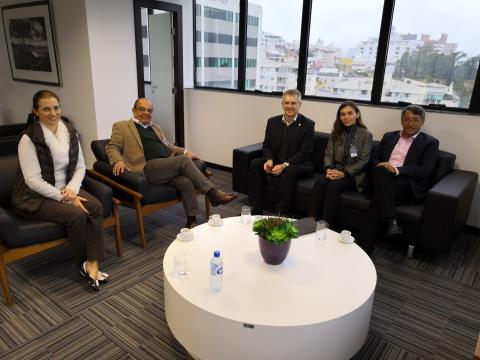
Meetings with two relevant stakeholders of the innovation ecosystem of Santa Catarina. Left picture: meeting with the IoT Coordinators of ACATE, Fabiano Wiggers (bottom right) and Hamilton Avinco (top right). The other attendees were (from left to right) Dr Jessica Ocampos (Camnexus), Prof. Ricardo Rabelo (UFSC), Prof Richard D Souza (UFSC), Prof. Carlos Montez (UFSC) and Dr Pablo Salas (taking the picture). Right picture: meeting with the Director of Finance and Administration of SEBRAE, Anacleto Ortigara (middle). The other attendees were (from right to left) Dr Pablo Salas (C-EENRG), Dr Jessica Ocampos (Camnexus) and Prof Alvaro Lezana (UFSC).

